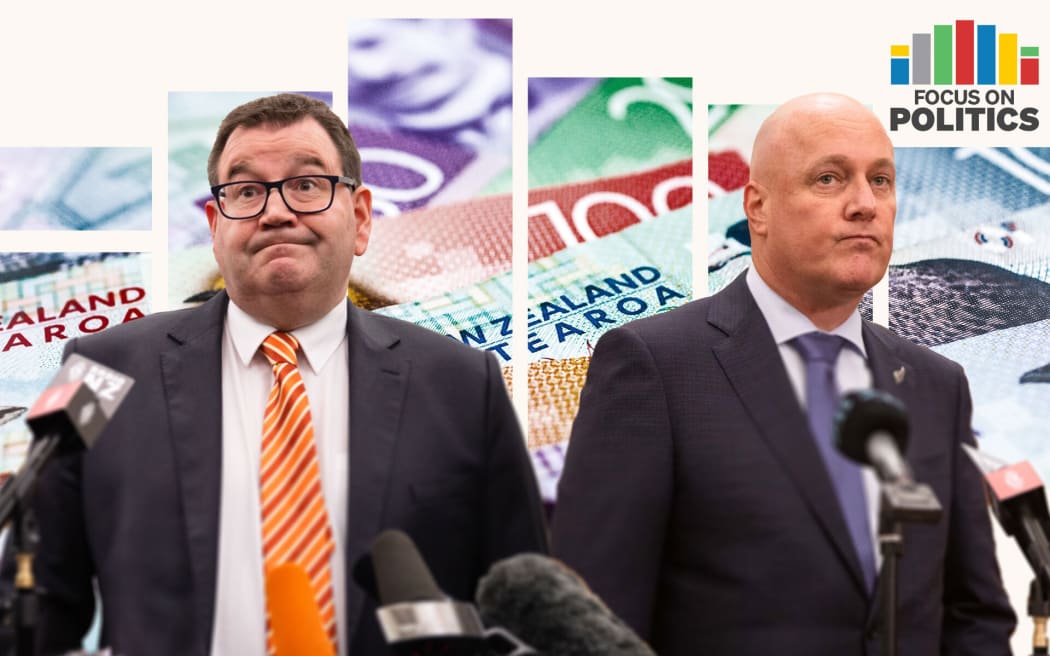
Photo: RNZ
"Inflation is no one's friend and in order to rid the country of inflation, we need to reduce spending levels," - Reserve Bank Governor Adrian Orr
Dire economic predictions and high interest rates from the Reserve Bank this week have increased the pressure on Labour, and given National a chance to pitch itself as the solution.
The opposition party also ditched its politically problematic plan to cut the top tax rate, after weeks of laying the groundwork.
Against a backdrop of global uncertainty and conflict, the cost of living continues to worsen for New Zealanders.
Rebounding tourism is creating more demand and record-low unemployment is boosting wages - a recipe that promises to keep inflation higher for longer.
The Reserve Bank is predicting a year-long recession starting mid-2023 will curb spiralling prices, and this week lifted the official cash rate a record 75 basis points to help push things along.
It aims to slow the rate of borrowing, but this inevitably means more pressure on households. Mortgagees on floating rates or with fixed terms ending soon will be feeling increasingly stressed - particularly those first-home buyers who may have borrowed large sums.
Read more:
- Labour's nightmare reality - an election year recession
- Recession: What you need to know
- OCR hike not fair, necessary or likely to stop rising prices - economist
- Orr apologises for 'significant economic shocks', says RBNZ engineering recession
- OCR hike: What we know so far and what is being said
- National's tax policy under review post-OCR hike, Luxon says
- The OCR: What you need to know
As well as higher mortgage rates, a higher OCR will also impact on the job market - unemployment is sitting at 3.3 percent, but is forecast to rise to over 5 percent through 2024 and 2025.
Governor Adrian Orr assured MPs at Parliament's finance committee the bank had run scenarios with the cash rate over 7 percent, unemployment at 9 percent, and house prices falling at 45 percent, the financial system would remain stable.
"But without a doubt there will be some households who will need to be talking very quickly with their banks around making sure they have strong relationships," he said.
National's Christopher Luxon has been criticising the government's spending since he took over as leader about this time last year, and says four quarters of recession is not good for the country.
"When you go from a 2.5 percent interest rate to a 6.5 percent interest rate and even higher, that is huge amounts of pain. How do you find $600 extra after tax to be able to deal with that and just pay the interest cost?"
The party took the chance in response to ditch its plan to cut the tax rate for earnings over $180,000 - a hard sell during a cost of living crisis - though it is still campaigning on indexing thresholds to inflation.
ACT leader David Seymour says given inflation is much worse than six months ago, the OCR hike should come as no surprise. He says the Reserve Bank is doing the right thing but the government is still "dragging the chain" on immigration and continuing to spend.
Prime Minister Jacinda Ardern argues New Zealand's spending as a percentage of GDP - 31 percent, down from 35 percent - has dropped below the levels seen under National in 2009 during the Global Financial Crisis.
Her deputy and Finance Minister, Grant Robertson, argues the economy is also expected to remain strong with low unemployment.
"Doesn't stop it being tough for people but in a global inflation crisis New Zealanders are as well positioned as anyone. The Reserve Bank has its job to do to bring inflation back down - from our point of view we have fiscal policy that we believe is responsible and balanced to support people with low and middle income."
But the Reserve Bank put heavy emphasis on the labour shortage.
While Robertson says "significant changes" were made as borders reopened and the government remains committed to filling skills gaps, his National Party analogue Nicola Willis says settings need changing urgently.
"We implore them once again, fix it. If this economy doesn't get workers we're going to have New Zealanders paying the price every time they pay at the eftpos terminal and every time they make a mortgage payment - get it sorted."
All this leaves a lot of challenges for the government, with an election year expected to be all about the economy - particularly if Treasury's latest economic data proves as gloomy as the Reserve Banks when it's released in three weeks.
In today's Focus on Politics podcast, RNZ Political Editor Jane Patterson revisits the interest rate shock that spells trouble for an under-pressure Labour Party.
Listen free to Focus on Politics on Apple Podcasts, on Spotify, on iHeart Radio or wherever you get your podcasts.


